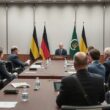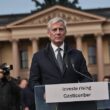Former Constitutional Court Judge Udo Di Fabio has cautioned against pursuing a ban of the Alternative for Germany (AfD) party, while also commenting on the escalating tensions between Israel and Iran.
Di Fabio acknowledged the necessity of observing the AfD given concerning trends towards radicalization. However, he stated that the evidence currently available from the Federal Office for the Protection of the Constitution does not, in his view, convincingly demonstrate the existence of a “militant hostility to the constitution” that would justify a ban. He voiced fears that such a legal challenge could ultimately backfire, strengthening the AfD or inadvertently paving the way for an even more radical political entity to emerge. He suggested that a more effective strategy involves politically weakening the party. Di Fabio noted that the AfD’s growth has already stalled, in part due to the perception that the current governing coalition is serious about curbing migration. He believes that continued demonstrable action and clear communication from the government could further erode support for the AfD.
Regarding the recent military actions by Israel against Iran, Di Fabio expressed understanding, citing Tehran’s long-standing threat to regional stability. He emphasized that Iran and its “terror groups” pose a danger not only to Israel but also to countries like Saudi Arabia and warned of the catastrophic consequences of Iran acquiring nuclear weapons. He pointed out the potential for similar preemptive action to become a precedent for other nations, stating that international law evolves in response to political realities.
Di Fabio also defended comments made by opposition leader Friedrich Merz, who described Israel as performing “dirty work” for everyone. He argued that weakening Iran serves the peace interests of many nations, including the Iranian people themselves. While skeptical about the potential for purely military solutions in the Middle East, Di Fabio suggested that a shift in strategic positioning may be occurring.
Ultimately, the former judge advocated for a clearer articulation and defense of national interests, suggesting that a more direct approach to problem-solving may be necessary to counter growing public disengagement from the political process, despite reservations about the specific phrasing used.





